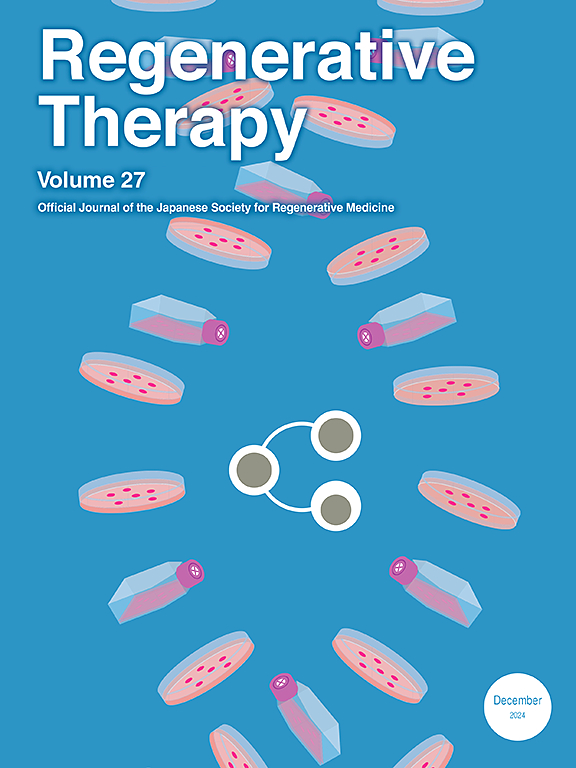A comprehensive review of clinical trials and Progress in stem cell therapies for advanced heart failure
IF 3.5
3区 环境科学与生态学
Q3 CELL & TISSUE ENGINEERING
引用次数: 0
Abstract
Heart failure (HF) is a global epidemic with a rising burden on individuals and healthcare systems. Advanced HF is characterized by severe symptoms at rest and marked limitations in physical activity. Stem cell therapies potentially address the limitations of current conventional treatments by reversing damage to cardiac tissue via their unique capacity for self-renewal and multilineage differentiation.
This article summarized the mechanism of action and methods for each stem cell approach and provided a detailed summary of associated clinical trials focusing on efficacy, safety profiles, and future directions.
We conducted a systematic review with a comprehensive search from 2014 to 2024 using databases such as PubMed, SCOPUS, and Google Scholar. Articles that met the inclusion criteria were selected by abstract review and subsequent assessment of the full text.
This review analyzes 27 clinical trials investigating stem cell-based therapies for advanced HF across different clinical phases (Phases I, II, and III) conducted between 2014 and 2024. These approaches include adult stem cells (ASCs) such as cardiac stem cells (CSCs), cardiosphere-derived cells (CDCs), cardiac progenitor cells (CPCs), unfractionated bone marrow-derived mononuclear cells (BMMNCs), mesenchymal stem cells (MSCs) and pluripotent stem cells (PSCs) such as embryonic stem cells (ESCs, induced pluripotent stem cells (iPSCs).
While the exact mechanisms through which stem cells exert their therapeutic effects in advanced HF remain under investigation, recent attention has shifted toward the paracrine signaling effects of injected cells. All approaches have demonstrated clinically acceptable safety profiles; however, their efficacy varies and has yet to be conclusively confirmed. MSC-based therapy is the most widely used among the different cell choices and has consistently exhibited promising outcomes. Although ESCs are promising for heart regeneration, their use is significantly limited by ethical issues that advancements in iPSCs may potentially address. With further efficacy validation, especially in phase III clinical trials, stem cell therapies hold promising potential for clinical application in advanced HF.
干细胞治疗晚期心力衰竭的临床试验和进展综述
心力衰竭(HF)是一种全球性流行病,对个人和医疗保健系统造成的负担越来越大。晚期心衰的特点是休息时出现严重症状,身体活动明显受限。干细胞疗法通过其独特的自我更新和多谱系分化能力逆转心脏组织损伤,有可能解决当前常规治疗的局限性。本文总结了每种干细胞治疗方法的作用机制和方法,并提供了相关临床试验的详细总结,重点是疗效、安全性和未来发展方向。我们使用PubMed、SCOPUS和谷歌Scholar等数据库,对2014年至2024年的数据进行了系统回顾和全面检索。通过摘要审查和随后的全文评估来选择符合纳入标准的文章。本综述分析了2014年至2024年间进行的27项临床试验,这些试验研究了基于干细胞的治疗晚期心衰的不同临床阶段(I、II和III期)。这些方法包括成体干细胞(ASCs),如心脏干细胞(CSCs)、心球源性细胞(cdc)、心脏祖细胞(cpc)、未分离的骨髓源性单个核细胞(BMMNCs)、间充质干细胞(MSCs)和多能干细胞(PSCs),如胚胎干细胞(ESCs)、诱导多能干细胞(iPSCs)。虽然干细胞在晚期心衰中发挥治疗作用的确切机制仍在研究中,但最近的注意力已转向注射细胞的旁分泌信号作用。所有方法均具有临床可接受的安全性;然而,它们的功效各不相同,尚未得到最终证实。在不同的细胞选择中,以骨髓间质干细胞为基础的治疗是最广泛使用的,并且一直显示出有希望的结果。尽管ESCs在心脏再生方面很有前景,但它们的使用受到伦理问题的极大限制,而iPSCs的进步可能会解决这些问题。随着进一步的疗效验证,特别是在III期临床试验中,干细胞疗法在晚期心衰的临床应用中具有很大的潜力。
本文章由计算机程序翻译,如有差异,请以英文原文为准。
求助全文
约1分钟内获得全文
求助全文
来源期刊

Regenerative Therapy
Engineering-Biomedical Engineering
CiteScore
6.00
自引率
2.30%
发文量
106
审稿时长
49 days
期刊介绍:
Regenerative Therapy is the official peer-reviewed online journal of the Japanese Society for Regenerative Medicine.
Regenerative Therapy is a multidisciplinary journal that publishes original articles and reviews of basic research, clinical translation, industrial development, and regulatory issues focusing on stem cell biology, tissue engineering, and regenerative medicine.
 求助内容:
求助内容: 应助结果提醒方式:
应助结果提醒方式:


